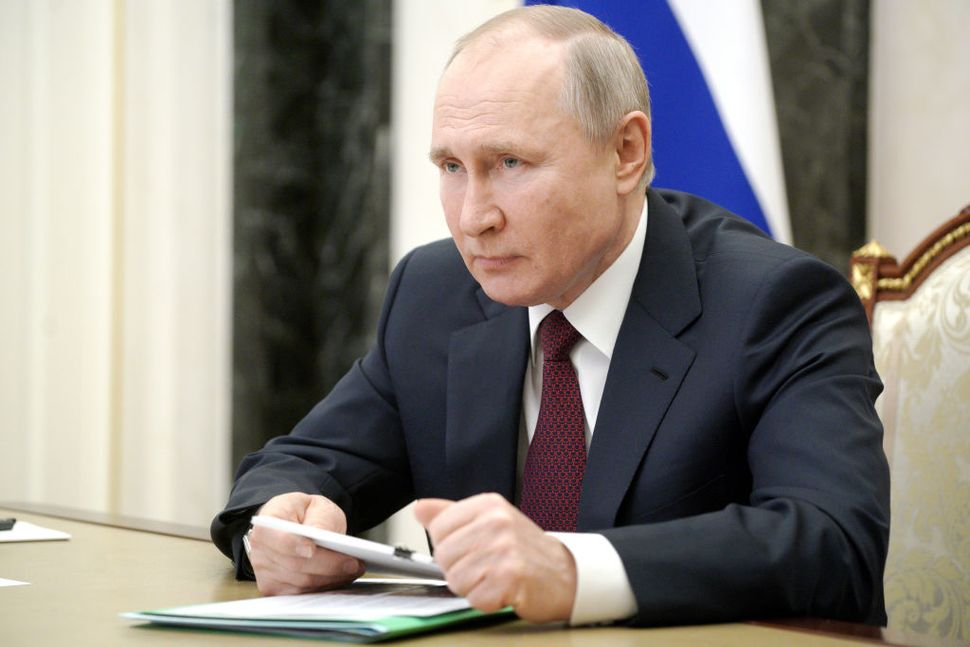Russian President Vladimir Putin on Thursday responded to condemnation from President Joe Biden by simply wishing the U.S. leader "good health," a comment broadly seen as a sly warning at a time relations between the countries have deteriorated to potentially dangerous levels. Putin's comments on Russian television followed an interview ABC News aired with Biden on Wednesday in which he agreed that the Russian leader is "a killer" and said he "will pay a price" for recent acts of aggression, including the U.S. assessment that Moscow attempted to interfere in the 2020 election. "What would I answer [to] him? I would say to him: Be healthy! I wish him health," Putin said Thursday morning, according to a translation of his remarks. He added his comments are "without irony, no jokes." Though unlikely a threat of physical harm against Biden himself, many drew parallels to the series of Russian dissidents who have fallen victim to poisoning attacks – most recently Alexei Navalny – and other methods of assassination, many of which U.S. officials believe were ordered by Putin. Other Russian officials lashed out at Biden's rhetoric. Kremlin spokesman Dmitry Peskov in a press conference Thursday morning called the comments "very bad statements," adding that Biden "definitely does not want to improve relations with our country." Chairman of the State Duma Vyachseslav Volodin late Wednesday said Biden's remarks were offensive to the Russian people and represented "hysteria from impotence." Russia took the rare step of recalling its ambassador to the U.S. for "consultations" following Biden's remarks. The rhetorical clash comes at a low-point in relations between Russia and the U.S. along with its Western allies reminiscent of 2014 when troops loyal to Moscow first invaded Ukraine. Thursday marked the seven-year anniversary of Russia's annexation of the Crimean Peninsula amid its campaign in Ukraine's eastern reaches, and earlier this week officials in Europe raised alarm about new provocative moves by Russian-backed forces in the ongoing conflict zone there. The G-7 economic bloc issued a statement of condemnation Thursday against Russia regarding Crimea, a move Kiev and its Western backers consider illegal. "Russia has clearly violated international law," foreign ministers from the seven countries wrote in a joint statement. Russia was removed from what was then the G-8 in 2014. Former President Donald Trump, who rarely criticized Russia and Putin in public, repeatedly advocated for Russia rejoining the bloc during his administration. Despite whatever goodwill may have rebounded under Trump, Biden has taken clear aim at Moscow following U.S. confirmation of its meddling in the presidential election, along with a months-long cyberattack revealed late last year that penetrated deep into federal departments' servers known as SolarWinds, the software the hackers exploited.Following an assessment from the Office of the Director of National Intelligence that Russia was behind the attack, the Biden administration has pledged overt repercussions, most likely sanctions, along with covert forms of punishment for Moscow. Russia has warned against any such retaliation. Though focused on China as the leading global competitor, top officials within the Biden administration have also taken a new approach with Moscow. White House spokeswoman Jen Psaki said Wednesday the relationship will "look different. We will be direct. We will speak out on areas where we have concerns." Many analysts say this represents an important step in holding Russia – and chiefly Putin – accountable for provocative actions. "[Biden] must make good on his campaign promise to elevate values in the conduct of U.S. foreign policy, especially with respect to Russia – by calling out antidemocratic behavior and human rights abuses but also by following those words up with action," Michael McFaul, the U.S. ambassador to Russia until 2014 and an outspoken critic of Putin, wrote in Foreign Affairs earlier this year. Others, however, caution against spending too much time focusing on punitive measures for Russia without a clear plan for what they will achieve. "At this stage, the Biden administration has done a good job of distinguishing itself from Trump-administration Russia policy. This box can be checked," Michael Kimmage, a professor of history at Catholic University, wrote on Twitter. "Now is the right time to align statements, direct and otherwise, with a positive vision of where this relationship should go."
Putin Wishes Biden ‘Good Health’ as Russia Lashes Out at New U.S. Pressure
0
0
SHARES
9
VIEWS
Leave a Reply Cancel reply
BROWSE BY CATEGORIES
BROWSE BY TOPICS
Alexa Lardieri
Associated Press
Best States
Best Stocks
Biden
business
Business News
China
Collections: Business
Collections: Top News
Collections: US
coronavirus
Donald
economy
education
Education Lab
elections
Financial Advisors
foreign policy
health
Healthiest Communities
Healthiest Communities Health News
Health News
infectious diseases
Investing 101
Joe
Lisa Hagen
lung disease
National News
News
Paul D. Shinkman
personal finance
picks
Politics
public health
Russia
Stock Market News
Susan Milligan
Trump
United States
vaccines
Washington Whispers
world
world news
World Report
Archives
- June 2022
- May 2022
- April 2022
- March 2022
- February 2022
- January 2022
- December 2021
- November 2021
- October 2021
- September 2021
- August 2021
- July 2021
- June 2021
- May 2021
- April 2021
- March 2021
- February 2021
- January 2021
- December 2020
- November 2020
- October 2020
- September 2020
- August 2020
- July 2020
- June 2020
- May 2020
Nsapk.com is the driving force behind decisions that largely define the quality of our readers’ and users’ lives.
- Trending
- Comments
- Latest
Biden to Faucet Former Sen. Invoice Nelson to Lead NASA
April 11, 2021
Neera Tanden Withdraws Her Nomination for OMB Director
August 17, 2021
Copyright @ 2021 Nsapk.com. All rights reserved.









